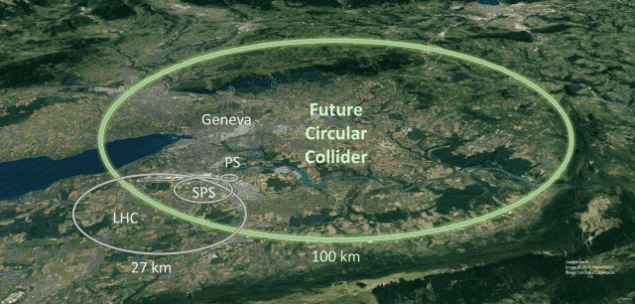European physicists look to the future of particle colliders
16 May 2019 Hamish Johnston
Hundreds of physicists from Europe and beyond have met in Granada, Spain to develop a plan for a next-generation collider that will eventually supersede the Large Hadron Collider (LHC) at CERN. While no decisions were taken about specific collider technologies at the open symposium of the European Strategy for Particle Physics, the 600 participants had their say on the important physics questions that need to be addressed by future collider facilities.
Fabiola Gianotti, director-general of CERN, said she received two main messages from the meeting. “Number one is that the particle-physics community is incredibly productive,” she said. “It’s amazing to see how much we have done since the last European Strategy for Particle Physics in 2013. The second message is there is an incredible amount of ideas.” Among the many “interesting questions” that she said Europe needed to address were the Higgs boson, dark matter and the “flavour problem”. “The Higgs is still mysterious [and] understanding the behaviour of the Higgs boson is a must. “Speaking after the meeting, Ursula Bassler, president of the CERN Council, said it is “important for decision makers to get a very broad input from as may physicists as possible. It is important to hear what the scientists say, not just heads of labs.”
“Frank and open discussions”
Fermilab’s Vladimir Shiltsev told Physics World that he was very pleased that participants from across the particle-physics community were able to have “frank and open discussions” at the meeting, adding, “participants did not stay away from hard questions”. Shiltsev, who has worked on accelerators worldwide said that he was also impressed with the organization that was done before the symposium that resulted in more than “160 well-thought-through input documents and suggestions that allowed fact-based discussions to take place in Granada.
Europe is not the only region that could host a next-generation collider, with plans afoot in both Japan and China. Indeed, about 15% of participants in Granada were from outside of Europe and Gianotti says that global cooperation will be crucial for the future success of particle physics. She added that it is possible that CERN could participate in collider projects outside of Europe but said that it is crucial that Europe has its own next-generation collider. Bassler adds that there is a strong will in the European physics community to have a facility in Europe – adding that Europe is leading the way towards a next-generation collider.
One CERN proposal for a next-generation collider is the Future Circular Collider, which would have a 100 km circumference and collide protons at energies up to 100 TeV. In contrast, the LHC has a 27 km circumference and a collision energy of 13 TeV. Another CERN proposal is the Compact Linear Collider, which would smash together electrons and positrons.
You can listen to Vladimir Shiltsev talk about the process of selecting a next-generation collider in the latest Physics World Weekly
physicsworld.com 17/5/2019

Δεν υπάρχουν σχόλια:
Δημοσίευση σχολίου